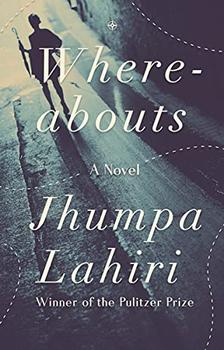Summary | Excerpt | Reviews | Beyond the book | Read-Alikes | Genres & Themes | Author Bio

Jhumpa Lahiri's Whereabouts has seen numerous comparisons to Second Place by Rachel Cusk. These two short novels, with American release dates a week apart, are both narrated from the point of view of an unnamed middle-aged woman reflecting on her life circumstances. But while Cusk's story is a fraught, frenzied work about a character bemoaning her lack of freedom, Lahiri's book is lower-key in presentation: It follows a melancholic professor living in a (presumably Italian) city, a solitary person looking in on the lives of others, wandering on the fringes of family and relationships.
As the title suggests, a sense of place is a major theme; Whereabouts unfolds in vignette-style chapters labeled by where they occur — ranging from the straightforward "On the Street" and "At the Trattoria" to the more conceptual "In My Head" and "In August." Each chapter appears as a closed system in which the narrator's emotions and inclinations seem to be controlled by the physical and conceptual properties of her situation. In one, she recollects an affair with a married man, remarking, "It was an incendiary time, a momentary surge that has nothing to do with me anymore." In another, she attends a dinner where she is drawn into discussion with another guest about a film but becomes irritated when the woman doesn't share her opinion, snapping, "Do you realize you have no idea what the fuck you're talking about?" In a different chapter, the potential calm of a country getaway is ruined when she makes an insignificant but stomach-turning discovery.
While the narrator often comes across as irritable and morose, her intense accounts are captivating. The novel's vignettes remind me of the autobiographical work of Soviet writer Mikhail Zoshchenko, who created vivid, snapshot-style depictions of his experiences in an attempt to understand the source of his unhappiness. Like Zoshchenko as narrator, Lahiri's protagonist is a moody storyteller, but it is the bitterness of her emotions that shocks her surroundings to life, and even her more anxious and disturbing thoughts contain a certain strange beauty. The overall effect can be summed up in one of the narrator's own musings as she strolls along a beach to the remains of an abandoned villa, among which several children are playing: "Outside, there's a ferocious noise coming from the crashing of the waves and the roar of the wind: a perpetual agitation, a thundering boom that devours everything. I wonder why we find it so reassuring."
The book's use of physical limitation as a device aligns with how it was written: Lahiri composed it in Italian, an acquired language for her, and later translated it into English. Likely as a result of this, the novel's language is sparse, which makes it feel timeless and lacking in specific location even as time and place in general play such a significant part. Buried in this sparseness is a deceptively alive story that builds in momentum even as it offers little in the way of actual plot.
While the narrator frequently seems like more of an oddity than an everywoman, her story is populated with small and large burdens of daily existence that will to an extent be familiar to any reader. Whereabouts reminds us that there is no escape from the confines and consequences of physical place and time, but its portrayal of these elements is cathartic, stimulating and satisfying.
![]() This review was originally published in The BookBrowse Review in June 2021, and has been updated for the
April 2022 edition.
Click here to go to this issue.
This review was originally published in The BookBrowse Review in June 2021, and has been updated for the
April 2022 edition.
Click here to go to this issue.

If you liked Whereabouts, try these:

by Yasmin Zaher
Published 2025
A bold and unabashed novel about a young Palestinian woman's unraveling as she teaches at a New York City middle school, gets caught up in a scheme reselling Birkin bags, and strives to gain control over her body and mind

by Aysegül Savas
Published 2025
Asya and Manu are looking at apartments, envisioning their future in a foreign city. What should their life here look like? What rituals will structure their days? Whom can they consider family?
Your guide toexceptional books
BookBrowse seeks out and recommends the best in contemporary fiction and nonfiction—books that not only engage and entertain but also deepen our understanding of ourselves and the world around us.